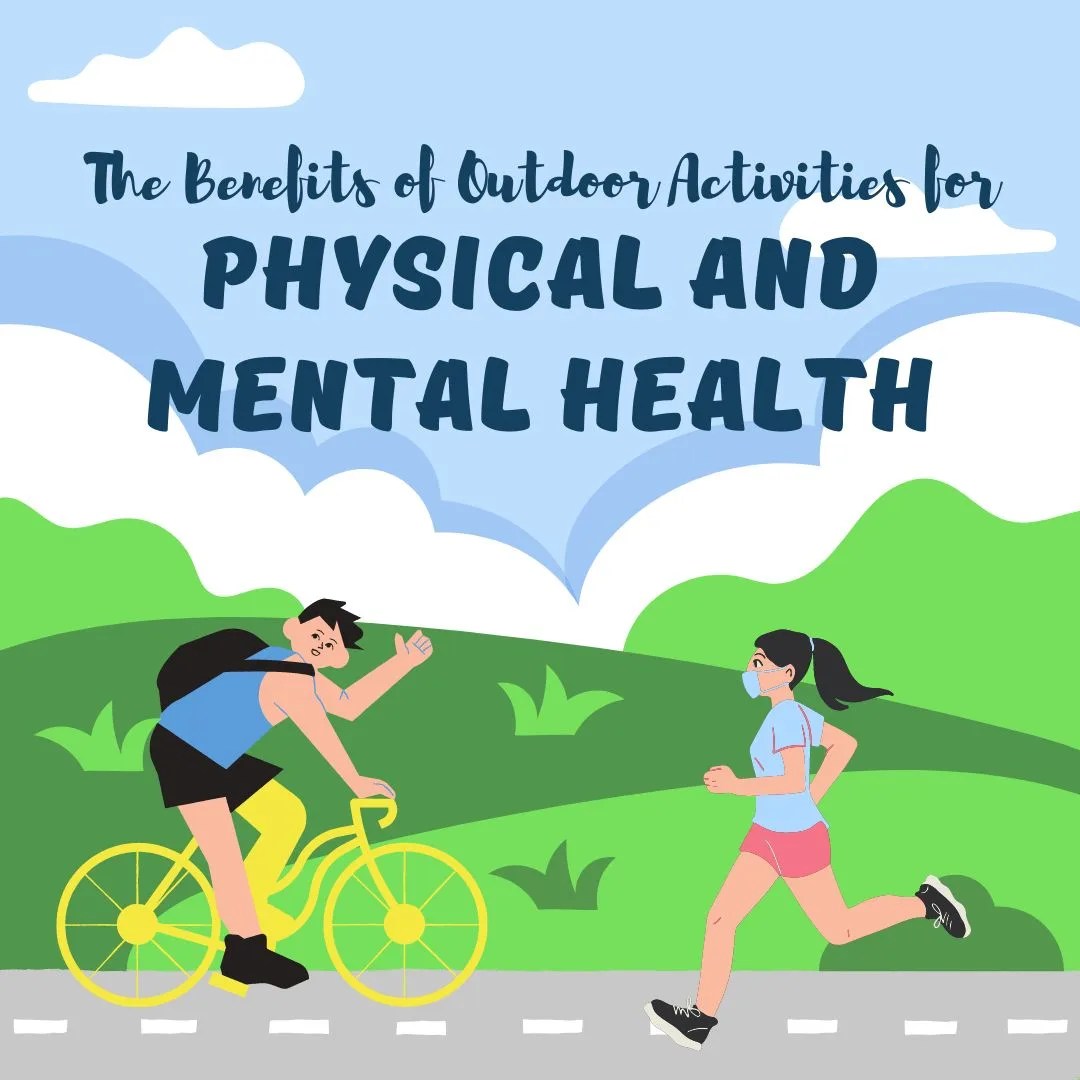The Benefits of Outdoor Activities on Mental Health
Outdoor activities boost mental health by reducing stress and improving mood. They enhance cognitive function and promote emotional well-being.
Spending time outdoors offers numerous mental health benefits. Engaging in physical activities like hiking, biking, or even walking in nature helps reduce anxiety and depression. Exposure to natural light increases serotonin levels, which can improve mood and energy. Outdoor activities also encourage social interactions, which can provide emotional support and decrease feelings of loneliness.
Regularly participating in outdoor pursuits can lead to better sleep patterns and a more positive outlook on life. Embracing nature not only strengthens mental resilience but also fosters a sense of peace and relaxation.
Introduction To Outdoor Activities
Outdoor activities are fun and good for your health. They involve being outside and moving your body. This could mean hiking, cycling, or just walking in the park. Outdoor activities can make you feel better and happier.
Importance Of Nature
Nature has a special way of calming our minds. Being in nature can reduce stress and anxiety. It helps us to relax and feel at peace. Fresh air and sunlight also improve our mood. Even a short walk in the park can make a big difference.
Historical Perspective
People have always enjoyed outdoor activities. In the past, our ancestors spent a lot of time outside. They hunted, farmed, and explored. These activities kept them healthy and strong. Today, we still need outdoor activities for our health. Modern life can be stressful. Outdoor activities help us cope with this stress.
Here are some benefits of outdoor activities:
- Better mood
- Less stress
- More energy
- Improved focus
Outdoor activities are good for everyone. They help both the body and mind. So, spend some time outside every day. Enjoy the benefits of nature!

Credit: myoutdoorjoy.com
Mental Health Improvement
Engaging in outdoor activities offers numerous benefits for mental health. Being in nature helps to improve mood, reduce stress, and boost overall well-being.
Stress Reduction
Outdoor activities significantly reduce stress levels. Nature provides a calming environment that helps people relax.
Engaging in physical activities outdoors, like hiking or biking, lowers stress hormones. This leads to a feeling of relaxation and peace.
Spending time outside also encourages mindfulness. It helps individuals focus on the present moment, away from daily worries.
Mood Enhancement
Nature has a positive impact on mood. Natural light and fresh air elevate happiness levels.
Outdoor activities release endorphins, which are feel-good hormones. This boosts overall mood and energy levels.
Social interaction during outdoor activities also enhances mood. It provides opportunities to bond with friends and family.
| Benefits | Description |
|---|---|
| Stress Reduction | Lower stress hormones, encourage mindfulness. |
| Mood Enhancement | Elevate happiness, boost energy, promote social bonding. |
- Engage in outdoor activities for improved mental health.
- Enjoy nature to reduce stress and enhance mood.
- Spend time outdoors for a happier, healthier mind.
Physical Benefits
Outdoor activities provide many physical benefits. Engaging in these activities can greatly improve overall health. Let’s explore some key advantages.
Exercise And Fitness
Outdoor activities encourage regular exercise and fitness. Walking, hiking, and cycling are great ways to stay active.
These activities help build muscle strength and improve cardiovascular health. They also promote better flexibility and balance.
- Walking improves heart health.
- Hiking builds leg muscles.
- Cycling enhances endurance.
Boosting Energy Levels
Outdoor activities can boost energy levels. Fresh air and sunshine have a positive impact.
Being active outside helps the body produce more vitamin D. This vitamin is essential for maintaining high energy levels.
Regular outdoor exercise also improves sleep quality. Better sleep leads to feeling more energetic during the day.
| Activity | Energy Boost |
|---|---|
| Walking | Moderate |
| Hiking | High |
| Cycling | Very High |
Social Interaction
Engaging in outdoor activities offers more than just physical benefits. One significant advantage is the opportunity for social interaction. Connecting with others in nature can improve mental health.
Building Relationships
Outdoor activities provide a natural setting to build new relationships. Whether hiking, biking, or playing a team sport, these activities encourage bonding. People feel more connected when they share experiences. This connection can lead to lasting friendships.
Shared outdoor experiences create opportunities to talk and laugh. These moments strengthen the bond between participants. Strong relationships are crucial for mental health. They offer support during challenging times.
Community Engagement
Outdoor activities often bring people together, fostering community engagement. Local parks, trails, and recreational areas are common gathering spots. These places promote a sense of belonging.
Communities that engage in outdoor activities tend to be more cohesive. They organize group events like nature walks, clean-up drives, and sports leagues. Participating in these events enhances social ties.
Community engagement also provides a support network. This network can significantly improve individual well-being. Being part of a community reduces feelings of isolation and loneliness.
Here are some benefits of community engagement through outdoor activities:
- Increased sense of belonging
- Better support systems
- Opportunities for volunteerism
- Enhanced community spirit
Connection With Nature
Connecting with nature brings immense benefits to our mental health. Being outdoors reduces stress, improves mood, and enhances overall well-being.
Mindfulness And Meditation
Practicing mindfulness and meditation outdoors enhances the experience. Nature’s sights and sounds help focus the mind. This reduces anxiety and promotes a sense of calm. You can meditate near a river or in a quiet forest. The natural environment improves concentration and relaxation. Deep breathing exercises become more effective in fresh air. Outdoor mindfulness practices offer a unique way to connect with the present moment.
Nature Therapy
Nature therapy involves spending time in green spaces for healing. It is also known as ecotherapy. Activities like hiking, gardening, and forest bathing fall under nature therapy. These activities improve mental health by reducing negative thoughts. Engaging with nature boosts self-esteem and provides a sense of purpose. Studies show that nature therapy lowers cortisol levels. This hormone is responsible for stress.
- Hiking: Increases physical activity and mental clarity.
- Gardening: Promotes mindfulness and reduces stress.
- Forest Bathing: Enhances mood and lowers anxiety.
| Activity | Benefit |
|---|---|
| Hiking | Increases physical activity and mental clarity |
| Gardening | Promotes mindfulness and reduces stress |
| Forest Bathing | Enhances mood and lowers anxiety |

Credit: www.piedmont.org
Creativity And Problem-solving
Spending time outdoors can boost your creativity. Nature offers a fresh perspective. It helps you think outside the box. Outdoor activities enhance problem-solving skills. Engaging with nature gives your brain a break. This helps you approach challenges with a clear mind.
Inspiration From Surroundings
Nature is full of inspiration. The vibrant colors of flowers can spark ideas. The sound of a flowing river can soothe your mind. Watching the sunset can make you feel peaceful. These experiences fuel your creative energy. They can help you come up with new solutions.
Enhanced Cognitive Function
Outdoor activities also improve cognitive function. Walking or hiking increases blood flow to the brain. This helps you think more clearly. Physical activity releases endorphins. These chemicals make you feel happy and focused.
Here are some benefits of outdoor activities on cognitive function:
- Improved memory
- Better attention span
- Increased mental clarity
- Enhanced problem-solving skills
A study showed that people who spend time outside perform better on tasks. They can solve problems more effectively. Their creativity levels are higher.
Activities To Try
Engaging in outdoor activities can significantly improve mental health. They help reduce stress and anxiety while boosting mood. Below are some activities to try that can enhance your mental well-being.
Hiking And Walking
Hiking and walking are simple yet effective ways to improve mental health. They offer a chance to connect with nature and breathe fresh air. Walking in green spaces can lower stress and enhance mental clarity.
- Explore local parks
- Take a stroll by the beach
- Join a hiking group
These activities require minimal equipment. A comfortable pair of shoes and a water bottle are enough to get started. Regular walking or hiking can also improve cardiovascular health.
Camping And Picnicking
Camping and picnicking provide a break from the daily grind. They offer a chance to relax and enjoy the beauty of nature. Camping can be a great way to disconnect from technology and recharge your mental batteries.
| Activity | Benefits |
|---|---|
| Camping | Improves sleep quality, reduces stress |
| Picnicking | Encourages social interaction, boosts mood |
Essential items for camping include a tent, sleeping bag, and cooking supplies. For picnicking, pack a blanket, food, and beverages. These activities are perfect for bonding with family and friends.
Overcoming Barriers
Engaging in outdoor activities can greatly benefit mental health. Yet, many people face barriers that prevent them from enjoying these benefits. Let’s explore how to overcome these challenges.
Accessibility Issues
Accessibility is a common barrier. Not everyone lives near parks or nature trails. Here are some solutions:
- Local Parks: Find small parks in your community.
- Urban Green Spaces: Use city green spaces for quick breaks.
- Public Transport: Use buses or trains to reach nature spots.
For those with physical disabilities, adaptive equipment can help. Wheelchair-accessible trails are available in many places. Online maps can guide you to accessible locations.
Motivation Challenges
Staying motivated can be tough. Here are some tips:
- Set Small Goals: Start with short walks.
- Find a Buddy: Partner with a friend for activities.
- Schedule Time: Add outdoor time to your calendar.
- Track Progress: Use apps to log your activities.
Small steps can lead to big changes. Celebrate your progress, no matter how small. This will keep you motivated and engaged.

Credit: trustcarehealth.com
Conclusion
Embracing outdoor activities significantly boosts mental health. Fresh air and nature improve mood and reduce stress. Regular outdoor exercise enhances well-being and fosters a positive outlook. Prioritize outdoor adventures for a healthier mind. Reap the benefits of nature and improve your mental health today.







